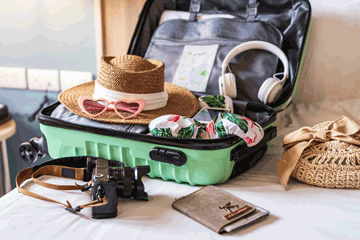If you’re going interrailing around Europe, getting the right insurance is essential. Here’s everything you need to know about interrailing travel insurance.

Key Points
- Interrailing travel insurance typically includes everything standard travel insurance covers.
- The cost can vary based on trip length, personal circumstances, and needs.
- You might need to buy a specialised policy or pay an optional add-on to get covered for things like high-risk activities.
- Some insurance policies have time limits, so read terms and conditions to ensure you're covered for the duration of your trip.
- It's worth buying travel insurance even with a European Health Insurance Card (EHIC) or the Global Health Insurance Card (GHIC).
Do I need travel insurance for interrailing?
There's no legal requirement for you to have travel insurance for interrailing, but it's still worth buying.
It can help to cover costs if things go wrong, like travel disruptions from strikes or illness. For example, if you get sick and need medical treatment, travel insurance can cover the cost of treatment.
What should interrailing travel insurance cover?
A travel insurance policy should typically include:
-
Cancellation and curtailment costs: If you need to cancel or return home early for a certain reason.
-
Baggage cover: If your luggage is stolen, lost or accidentally damaged. It also typically includes cover for personal items.
-
Missed departure: If you can't go on your trip due to events outside of your control, like your car breaking down.
-
Medical emergencies and repatriation expenses cover: The cost of emergency medical treatment while abroad and the cost of medical repatriation back home.
What isn't covered by interrail insurance?
Common exclusions include:
-
Medical conditions that haven't been declared: Any treatment you need for a pre-existing medical condition isn't covered, unless the insurer has been made aware
-
High-risk sports: Standard travel policy usually doesn't cover high-risk sports or activities, such as skiing or scuba diving. If you want cover for either of these, you'll need travel insurance with scuba diving cover or winter sports cover.
-
Alcohol and drugs: If injury, illness or death occurs as a result of alcohol or drug intoxication, policies don't cover this.
-
Illegal or malicious activities: You can't claim for injury or damage caused by doing something illegal or malicious, such as breaking the law.
Travelling against government advice: If the Foreign, Commonwealth & Development Office (FCDO) advises against travel but you go anyway, your policy may not cover you.
What's the best travel insurance for interrailing?
The best travel insurance for interrailing depends on your interrailing trip and your personal circumstances. There are 2 main types of travel insurance to choose from:
-
Single-trip travel insurance which provides cover for a single trip during a 12-month period. The length of cover can vary from provider to provider. You're covered from start to finish and can travel to multiple places as part of the same trip.
-
Multi-trip travel insurance which provides cover for multiple holidays over a 12-month period. But some multi-trip insurance policies only cover you for 31 days at a time over 12 months, so it might not be enough cover for interrailing.
As your interrailing trip is likely going to be longer than 31 days, you may also want to consider long stay travel insurance. Otherwise known as backpacker insurance, this type of policy gives you cover for 1-18 months across multiple countries during a single trip. This type of policy is perfect if you're travelling on your gap year or just planning an extended holiday overseas.
What extras can I add to my policy?
This depends on you. You can tailor your standard policy to your needs by enhancing it with additional coverage options. These include the following:
-
Travel insurance with gadget cover: This covers your electronic devices against loss, theft or damage during your trip.
-
Ski travel insurance: Winter sports insurance covers you for lost or damaged equipment, medical expenses caused by accidents, as well as if the weather is too bad.
-
Adventure travel insurance: If you're planning to take part in certain high-risk activities, like bungee-jumping.
Top tip: Some insurers might include these as standard on their specialised policies, while others might only offer it as an optional extra. So, read the policy wording to know what you're getting.
How much does interrailing travel insurance cost?
The price for travel insurance for interrailing in Europe for 3 months is around £381, which is based on a backpackers insurance policy. But prices can vary depending on multiple factors. The fastest way to find out how much it might cost for you is to compare travel insurance quotes.
What affects the cost?
The cost of interrail travel insurance is typically affected by:
- Pre-existing medical conditions: You need to declare this so your insurer is aware.
- The length of time you're away: The longer you're away, the more you might need to pay.
- Any add-ons or optional extras you decide to get: If you need additional cover, such as adventure cover.
1The cheapest price for backpacker travel insurance. Based on 1 adult aged 30 travelling for 3 months in Europe. Confused.com data, November 2024.
Do I need travel insurance if I have an EHIC or GHIC?"
Yes, it's worth getting travel insurance for interrailing even with the European Health Insurance Card (EHIC) or the Global Health Insurance Card (GHIC).
Both cards provide access to state-provided medical care in the European Union (EU) at the same price as the citizens of the country you're in. In some instances you might be able to get it for free. If you have the GHIC, this includes certain countries outside of the EU, too.
But neither of these cards are a replacement for travel insurance. There's no guarantee they can cover your full treatment costs. And you can only get medical treatment in state hospitals or health facilities.
This is why it's important to have travel insurance.
Travel insurance with medical cover helps cover the cost of medical emergencies when travelling. It can also cover the price of getting back to the UK for medical reasons. Phew!
Compare travel insurance








